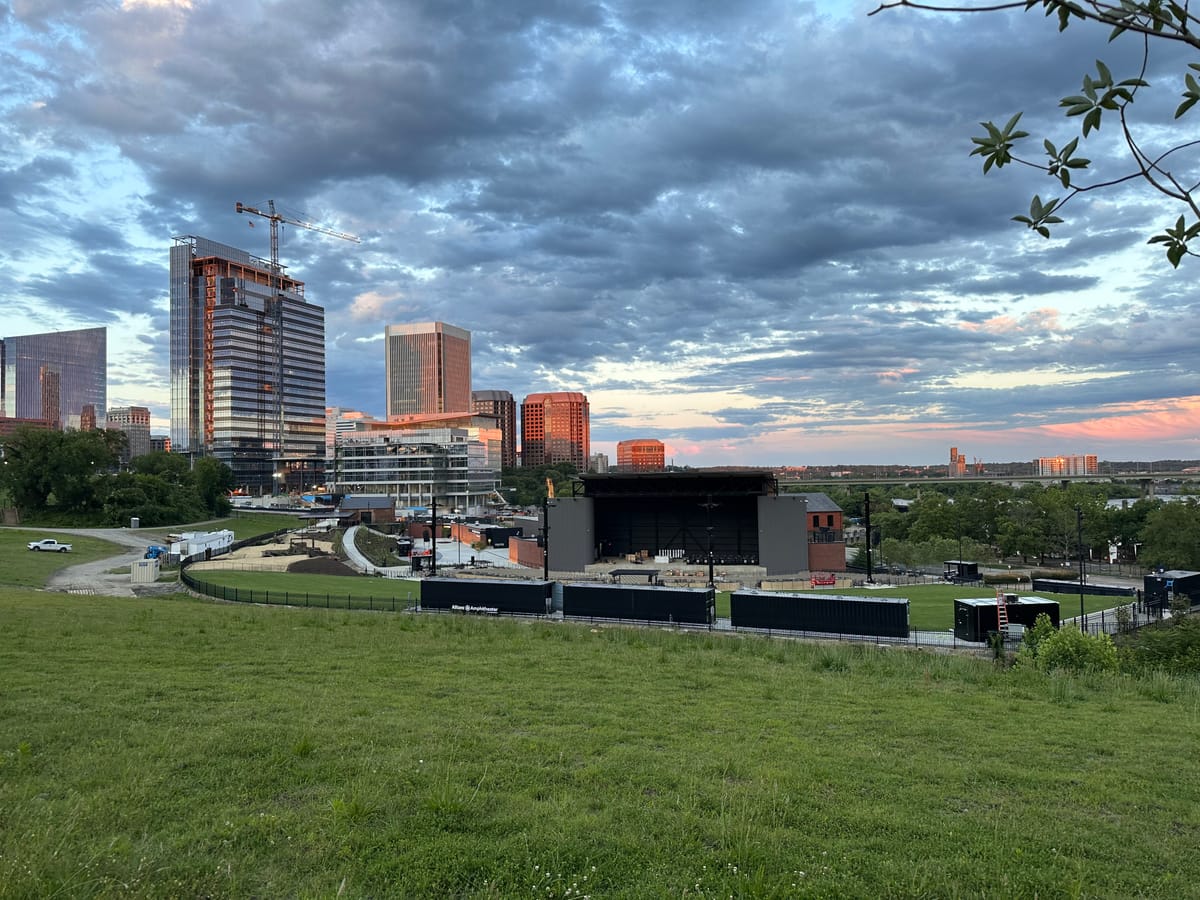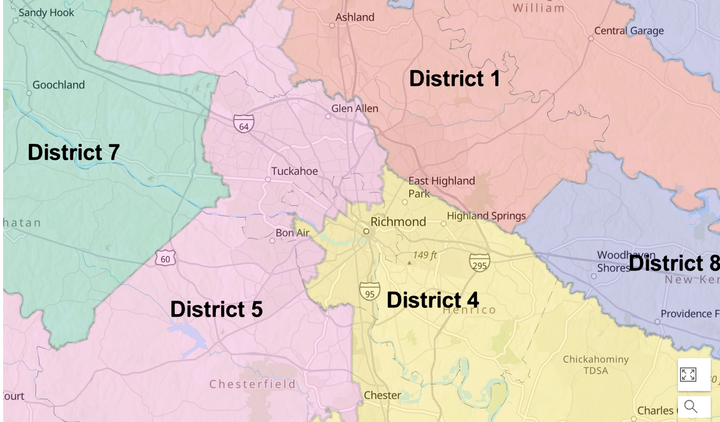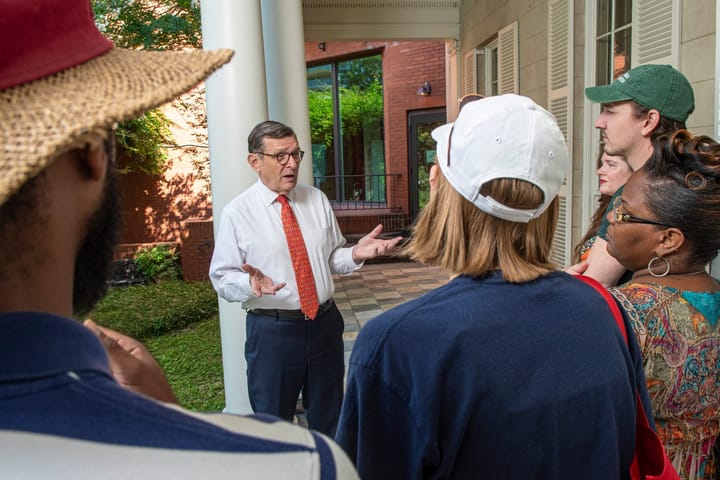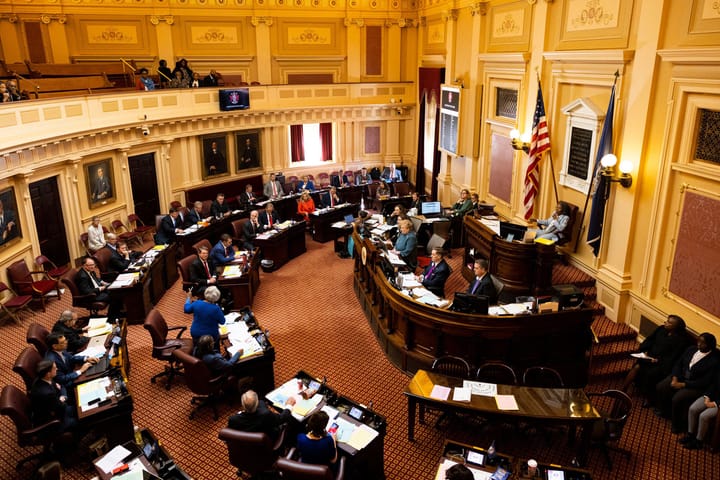New amphitheater renews long-running debate over parking permits for Oregon Hill residents

The Allianz Amphitheater is set to open its doors on Wednesday and promises riverside views with big-name acts, but for its Oregon Hill neighbors, that date comes with one big question: Where will everyone park?
Parking has been an oft-debated topic in the Oregon Hill neighborhood — a roughly 10-minute walk from the amphitheater and home to 1,276 individuals in its area of 0.1 square miles.
Oregon Hill doesn’t currently restrict its parking, save for a few northern streets closer to its neighbor, VCU. This means residents don’t need permits, and there are no time limits. Valerie L’Herrou, president of the Oregon Hill Neighborhood Association, nods to the longtime tension between Oregon Hill and the city as the reason behind the free spots.
L’Herrou said residents have wanted to curtail outside influence — including preventing parking restrictions — because the community feels it has historically been sidelined by Richmond in favor of other organizations and their interests, especially VCU.
City Councilmember Stephanie Lynch represents both Oregon Hill and other areas surrounding the amphitheater, and she said many longtime residents feel their community has “been eroded year after year after year” — a sentiment she traces back to VCU’s establishment in 1968. That context has influenced some neighbors’ initial reactions to the amphitheater.
“The ‘protect our neighborhood’ feeling has made it difficult for the neighborhood to get parking permits,” L’Herrou said.
While the neighborhood isn’t the most tightly packed in Richmond, it’s still dense. L’Herrou said parking already is at a premium since VCU students, local businesses’ customers, downtown workers and Brown’s Island visitors use the neighborhood’s free spots.
“There’s just really not enough places for the people who live here to park a lot of times,” L’Herrou said. “Certainly not for hordes of people.”
If Oregon Hill residents are interested in restricting parking, they can petition to form a residential parking district similar to the ones in The Fan. In those areas, neighbors have parking permits and guests are allowed either a temporary or visitor’s permit, according to the city website.
Still, Oregon Hill is reluctant to accept parking restrictions. L’Herrou said the community falls into two camps: one that wants to know they’ll for sure have a spot to put their car, and the other that wants more flexibility for their family, customers or tenants. This is an unresolved question, but L’Herrou is hopeful a resolution will be reached, and parking has come to the forefront of neighborhood discussions as the amphitheater’s opening approaches.
Amphitheater will try to steer traffic away from residents
The amphitheater won’t provide on-site parking to attendees, as its general manager, Rebecca Street, said there is only so much land available to make use of.
Street is aware of the neighborhood’s worries and has attended Oregon Hill’s community meetings to speak with neighbors about their concerns — something L’Herrou said she has appreciated.
“I think [Street] wants to be here for a long time, and so she wants to develop a good relationship with the community,” L’Herrou said. “I certainly believe in her good faith.”
Street said Allianz Amphitheater will provide concert-goers a rideshare zone and parking maps emailed with a ticket purchase — maps that won’t feature Oregon Hill as an option. Another deterrent could be the hilly, sometimes rocky walk between the neighborhood and the amphitheater. Street said that she thought the walk between the locations was impractical and dangerous — something she noticed during her frequent visits with the community.
The community has also been working to place LED signs on highways instructing concert-goers to take exits that would avoid Oregon Hill. While it isn’t yet confirmed that these signs will be used, Lynch said she believes they’ll be successful.
L’Herrou said that while these measures will likely usher non-Richmonders away from Oregon Hill, she’s worried that city natives will still use the residents’ free parking.
The neighborhood association has floated the idea of forming a committee to keep tabs on the new venue’s impact on parking, especially on the neighborhood’s southern streets closer to the amphitheater. L’Herrou said Oregon Hill may consider placing “no event parking” signs in the most impacted areas to attempt to discourage concert-goers from using residents’ spots. The signs may also inspire increased scrutiny from police.
The Richmonder is powered by your donations. For just $9.99 a month, you can join the 1,000+ donors who are keeping quality local journalism alive in Richmond.
Goal is to make music, not noise for neighbors
Beyond parking uncertainty, Oregon Hill residents are also bracing for noise. L’Herrou said waterfront shows hosted by outside groups have usually been louder and more disruptive than local events, and neighbors have approached her with their concerns about how loud things might get once the amphitheater opens.
The amphitheater foresaw this issue, too. Street said the corporation behind the amphitheater, Live Nation Entertainment, studied the area’s acoustics before the amphitheater began construction. Live Nation tested loudnesses on different parts of the property and found that decibel levels could be kept at “a reasonable level,” Street said.
To achieve this, Street said Live Nation built up the preexisting natural barriers around the site and added towers to bounce sound back to the audience. These additions also give the amphitheater’s sound engineer more control over noise spillage and volume to keep everything within limits.
The amphitheater spokesperson also noted in their email that the amphitheater has an 11 p.m. noise curfew, which city code reflects.
“I’m staying as active as I can with all of our neighbors,” Street said. “I visit with all of them, and I'm open to suggestions, but I think [the amphitheater is] a really great thing for the city, and I hope that they come down and join us for some of the concerts.”
Residents have played a key role in determining the amphitheater’s structure — Lynch said initial feedback before construction played into the raising of sound barriers and the amphitheater’s positioning of the main entrance on the facility’s north side.
Lynch said the amphitheater gives Richmond a chance to highlight “the jewel of our city,” the James River. She’s hopeful the venue will have a positive impact on its surrounding community. From what she’s seen, the amphitheater has made an effort to be a good neighbor by giving back to the community where it can.
“Without the community voicing their concerns, and then the amphitheater folks responding to it, things would have looked a lot different,” Lynch said. “I've seen a lot of developers come into town with projects, and this has definitely been one of the more pleasant and successful interactions and partnerships.”
Contact Reporting Intern Eleanor Shaw at eshaw@richmonder.org.






